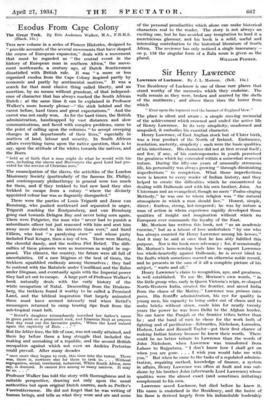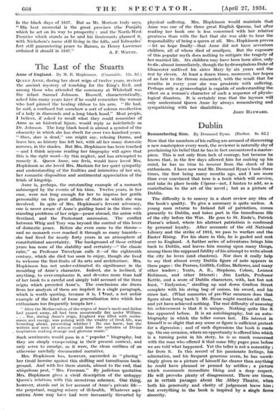Sir Henry Lawrence
Lawrence of Lucknow. By J. L. Morison. (Bell. 15s.) THE Residency of Lucknow is one of those rare places that stand worthy of the memories which they enshrine. The walls remain as they were, broken and scarred by the shells of the mutineers ; and above them 'rises the tower from which
" Ever upon the topmost roof the banner of England blew."
The place is silent and aware : a simple moving memorial of the achievement which crowned and ended the active life of Henry Lawrence. In its very simplicity, unadorned and unspoiled, it embodies his essential character.
Henry Lawrence, of East Anglian stock but of Ulster birth, was a true product of the North of Ireland. Endurance, resolution, austerity, simplicity : such were the basic qualities of his inheritance. His character did not at first reveal itself ; and few, if any, of his contemporaries in youth perceived the greatness which lay concealed within a somewhat reserved nature. During the fifty-one years of unusually strenuous life, his personality was always growing " through diminishing imperfections " to completion. What those imperfections were is known to every reader of Indian history, and they helped to create the difficulties which he encountered in dealing with Dalhousie and with his own brother, John. An Ulsterman and an evangelical, though no mere " Psalm-singing Methody," he was one to whom religion was " the natural atmosphere in which a man should live." Honest, simple, direct ; fearless, strong, hot-tempered ; he was by nature a man of action in whom experience rapidly developed those qualities of insight and imagination without which no European ever commands the loyalty of the East.
Mr. Morison has written this book, not " as an academic exercise," but as a labour of love undertaken " by one who has always counted Sir Henry Lawrence among his heroes." And it may be said at once that he has ably fulfilled this purpose. Nor is the book mere advocacy ; for, if occasionally Mr. Morison's hero-worship leads him to support Lawrence too whole-heartedly against Dalhousie, he is never blind to the faults which sometimes marred an otherwise noble record, and he presents in the sum of it all a complete picture of his subject, " warts and all."
Henry Lawrence's claim to recognition, aye, and greatness, is well established. To use Mr. Morison's own words, " in the little group who, early in Queen Victoria's reign, re-shaped North-Western India, created the frontier, and saved India from the chaos of the Mutiny," Lawrence was primus inter pares. His front1Tr administration, his eye for quality in young men, his capacity to bring order out of chaos and to make bricks without straw, made him for nearly twenty years the power he was from Delhi to the Afghan border. No one knew the Punjab or the frontier tribes better than he ; and the band of men he chose for the work both of fighting and of pacification—Edwardes, Nicholson, Lumsden, Hodson, Lake and Rennell Taylor—got their first chance of making Indian history because he knew their worth. There could be no better tribute to Lawrence than the words of John Nicholson, when Lawrence was transferred from Lahore to Rajputana, " I don't know how I shall get on when you are gone. . . . I wish you would take me with you." But when he came to the tasks of a regulated adminis- tration, requiring method, knowledge of finance, a system in affairs, Henry Lawrence was often at fault and was out- shone by his brother John (afterwards Lord Lawrence) whose qualities were the almost exact (and sometimes irritating) complement to his own.
Lawrence saved Lucknow, but died before he knew it. His name is enshrined in the Residency, and the lustre of his fame is derived largely from his indomitable leadership in the black days of 1857. But as Mr. Morison truly says, His best memorial is the great province (the Punjab) which he set on its way to prosperity ; and the North-West Frontier which stands as he and his lieutenants planned it, with Nicholson's name still living in the hills, and Edwardes' fort still guaranteeing peace to Bannu, as Henry Lawrence













































 Previous page
Previous page